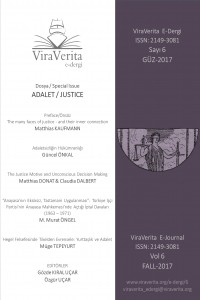Abstract
Abstract
Giorgio Agamben has emphasized the issue
of individual and recognition as a citizen in the Homo Sacer. I think that
addressing this problem in the context of Hegel's Phenomenology of Spirit and
Philosophy of Right is important for current political and social practices.
Because the problem with the world is a self-conscious problem. Hegel has also
dealt with a dialectical process while dealing with the essential social,
subjective, and interactive world. It establishes or aims at the relation of dialectical
recognition in the Hegel system with the assumption of ideal state and
citizenship. This dialectical attitude hides the fact that some social dilemmas
are overcome and their contingent side. Such a recognition process also points
to the fact that the subject's domain of subjective freedom erodes in the
thought of a unity. A few basic questions/problems
arise in this direction. I start with a quote from Agamben's book is to reveal
the exact question/problem. Is there
always a positive recognition and unity from the conflict between the
subjectivity of the individual and the objectivity of the state? Can an
idealized state and its product citizenship always offer a universal
understanding of justice for each individual who shares that social life?
In this study, I will try to present a
critique of the dialectical process in the context of the issues I have
discussed above, while examining the relation of absolute recognition between
the individual and the state. For each individual, I will establish the need to
establish a recognition relationship on more equal and equal terms, aiming at a
collective life on the basis of freedom and justice. I think we need a new
dialectic idea that opens doors to new possibilities from reproduced dual
opposites in order to shed light on the blind spots in the world we live in. In
this regard, this study explains the relation between recognition and justice,
which will be able to reassess the relationship of absolute recognition.
Keywords
References
- Agamben, G. (2013). Kutsal İnsan: Egemen İktidar ve Çıplak Hayat. (İsmail Türkmen, Çev.). İstanbul: Ayrıntı. Hegel, G.W.F. (2015). Tinin Görüngübilimi. (Aziz Yardımlı, Çev.). İstanbul: İdea Yayınları. Hegel, G.W.F. (2013). Anahatlarda Tüze Felsefesi ya da Doğal Hak ve Politik Bilim (Aziz Yardımlı, Çev.). İstanbul: İdea Yayınları. Herbert, M. (2013).Us ve Devrim. (Aziz Yardımlı, Çev.). İstanbul: İdea Yayınları. Honneth, A. (2015).Tanınma Uğruna Mücadele. (Özgür Aktok, Çev.). İstanbul: İthaki.
Abstract
Özet
Giorgio
Agamben’ in Kutsal İnsan’ da ortaya koyduğu yurttaş olarak birey ve tanınma
sorununu G.W.F. Hegel’in Tinin Fenomenolojisi ve Hukuk Felsefesinin Anahatları
bağlamında ele almanın ve yeniden hatırlamanın güncel politik ve toplumsal
pratikler için önemli olduğunu düşünüyorum. Çünkü insanın dünyayla sorunu
özbilinç sorunudur. Hegel özbilinci toplumsal, öznelerarası ve etkileşimsel bir
dünyada ele alırken aynı zamanda diyalektik bir süreci de işletmiştir. Hegel
sisteminde ortaya koyduğu diyalektik tanınma ilişkisini ideal bir devlet ve
yurttaşlık varsayımıyla kurar ya da onu amaçlar. Bu diyalektik tavır bir takım
toplumsal açmazların aşılması olanağını ve olumsal yanlarını gizler. Böylesi
bir tanınma süreci, aynı zamanda bireyin öznel özgürlük alanının bir birlik
düşüncesinde eridiğine işaret eder. Bu doğrultuda ortaya bir kaç temel
soru/sorun çıkar. Agamben’in kitabından bir alıntıyla başlama sebebim tam da
işaret etmeye çalıştığım soru/sorunları ifşa etmeye yöneliktir. Bireyin
öznelliği ile devletin nesnelliğinin çatışmasından her zaman olumlayıcı bir
tanınma ve birlik çıkar mı? İdealize edilmiş bir devlet ve onun ürünü
yurttaşlık her zaman için o toplumsal yaşamı paylaşan tek tek her bir birey
için evrensel bir adalet anlayışı sunabilir mi?
Bu çalışmada birey-devlet arasındaki mutlak tanınma
ilişkisini irdelerken yukarıda sorunsallaştırdığım meseleler çerçevesinde
diyalektik sürecin de bir eleştirisini sunmaya çalışacağım. Tek tek her bir
birey için özgürlük ve adalet temelinde olumlayıcı beraber yaşamı amaçlayan
daha adil ve eşit şartlarda bir tanıma ilişkisi kurmanın gerekliliğini ortaya
koyacağım. Şu anda içinde yaşadığımız dünyadaki kör noktalara ışık tutabilmek
için yeniden üretilen ikili karşıtlıklardan ziyade yeni imkânlara kapı aralayan
yeni bir diyalektik fikre ihtiyacımız olduğu düşüncesindeyim. Bu sayede bu
çalışma tanınma-adalet ilişkisini açımlayarak; o mutlak tanınma ilişkisinin
yeniden değerlendirilmesine fırsat verecektir.
Keywords
References
- Agamben, G. (2013). Kutsal İnsan: Egemen İktidar ve Çıplak Hayat. (İsmail Türkmen, Çev.). İstanbul: Ayrıntı. Hegel, G.W.F. (2015). Tinin Görüngübilimi. (Aziz Yardımlı, Çev.). İstanbul: İdea Yayınları. Hegel, G.W.F. (2013). Anahatlarda Tüze Felsefesi ya da Doğal Hak ve Politik Bilim (Aziz Yardımlı, Çev.). İstanbul: İdea Yayınları. Herbert, M. (2013).Us ve Devrim. (Aziz Yardımlı, Çev.). İstanbul: İdea Yayınları. Honneth, A. (2015).Tanınma Uğruna Mücadele. (Özgür Aktok, Çev.). İstanbul: İthaki.
Details
| Primary Language | Turkish |
|---|---|
| Journal Section | Articles |
| Authors | |
| Publication Date | November 28, 2017 |
| Submission Date | May 1, 2017 |
| Published in Issue | Year 2017 Issue: 6 |


